Best Films of Steven Spielberg: The onset of the Hollywood New Age in the late ‘60s brought with it the most fertile period of American cinema. Brought up on classical Hollywood’s depiction of the foundational tenets of filmmaking, combined with the independent spirit learned from the New Waves in French, English, and Japanese cinema, along with their education from a plethora of films from around the world, its young directors were a new breed that would temporarily but significantly suspend studio control over films and pave the way for ‘directorial vision’ in Hollywood.
And the Hollywood New Wave had its unique figures, its poets, its mavericks, its visionaries, and its crazed auteurs. Among these was Steven Spielberg, a ‘movie brat,’ as he would describe himself alongside Scorsese, Lucas, and De Palma, and one of its most unique products. Today, he is the most commercially successful director of all time and one of cinema’s most enduringly influential figures.
This reputation works against him as owing to it, one tends to overlook how much of an experimentalist he really is. From his independent origins in the 70s, his rise to Hollywood’s peak in the 80s, his establishment as his country’s finest commercial filmmaker with an onslaught of fantastic films in the 90s and 2000s to his more reflective, risky, and yes, experimental style of filmmaking in recent years, Spielberg has reinvented himself over and over again.
And yet what has forever remained the same is an unfettered dedication to ensuring that his craftsmanship, which is always meticulous, never gets in the way of the heart of the film, its story, its world, its characters, its message, and its politics. An incurable lover of cinema and arguably its most consistently prolific proponent, Steven Spielberg is the kind of titanic figure that simply has no equals.
Related to Steven Spielberg: Here’s Where To Watch & Stream the Oscar-Nominated Movies: 2023 Academy Awards
At the 85th Academy Awards, with the three nominations he has received for ‘The Fabelmans’, Spielberg’s tally presently stands at twenty-two nominations across the board in his lifetime, and there’s no reason to doubt that there’s plenty more on the way.
15. Duel (1971)

Even ten years after Spielberg made his debut, watching ‘Duel’ would’ve seemed like the first feature film of an entirely different director, let alone now. A sinewy work of horror, Spielberg’s only foray into that genre (unless one counts ‘The Poltergeist’ as his film too, which is totally plausible) ‘Duel’ is a film with barely a plot as it is dedicated to exploring how shock works on screen, like many young adherents of Hitchcock at the time trying their own hand at thrillers. With no emotional quotient, it’s also an uncharacteristically cold work on his part that looks at masculinity asserting itself, given the film’s evident preoccupation with an apparent loss of it from the beginning.
As unrecognizable as it is in Spielberg’s canon, it does provide us with our first look at one of his signature styles – not showing the cause of terror and instead relying on the victim’s expressions to convey it. What begins as a seemingly harmless bit of competition between a truck driver and a businessman turns into the former’s harassment of the latter before snowballing into an out-and-out murder attempt that only keeps getting scarier by the minute. Hence, turning just an old, rusty truck into a veritable monster is quite the high-wire act from a first-time feature film director, regardless of it being a TV film. The credibility of ‘Duel’ lies in the fact that being a ‘car film,’ it didn’t go unnoticed despite having been released in the same year as ‘Vanishing Point’ and ‘Two-Lane Blacktop,’ two of the most iconic films in that genre. ‘
14. Saving Private Ryan (1998)
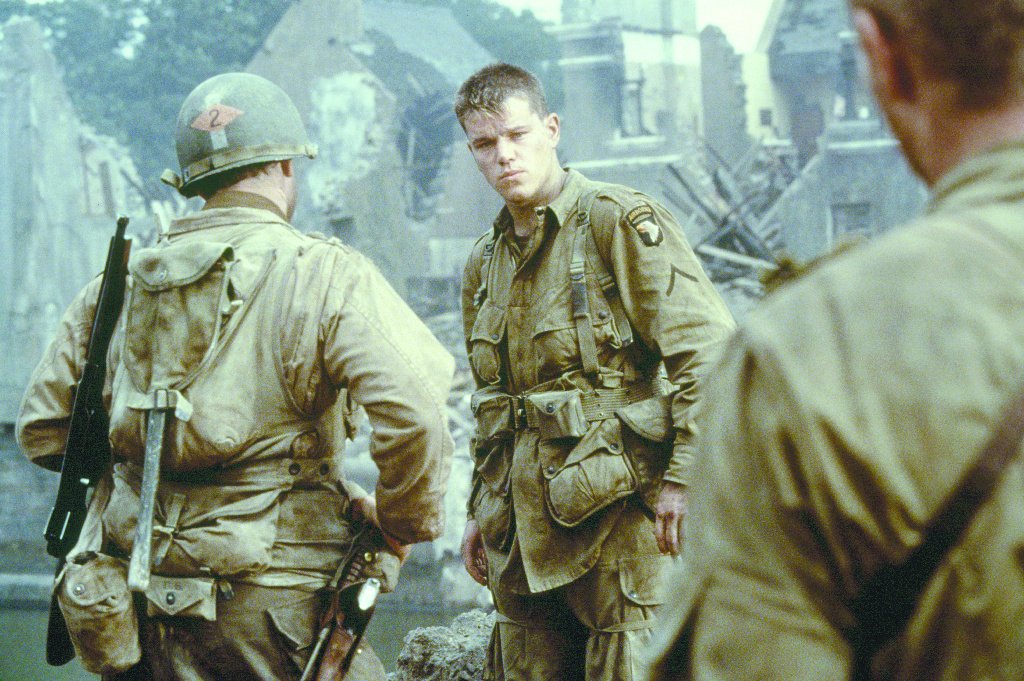
Not since Eisenstein’s ‘Battle of the Ice’ sequence in ‘Alexander Nevsky’ had a film so singularly changed the visual vocabulary used to depict war on film. But even if Eisenstein’s concern with depicting war on film with as much reality as was possible in the 1930s, given the medieval setting of the film, it was reduced to an exercise in the aesthetics of war. Kaminski’s documentary style of handheld shooting, putting us in the midst of the action, portrays war in all its gory brutality, even beyond its now mythical opening sequence, conjuring up a hellscape of dust, smoke, fire, dirt, mud, and blood.
Related to Steven Spielberg: 10 Great Movies Not Nominated For The Best Picture at the 95th Academy Awards
By the end of the film, it falls prey to one of Spielberg’s greatest weaknesses – the prolonged finale – which becomes sentimentally exploitative, as if he is imploring us to shed a few tears. But prior to that, there’s a film that, even keeping aside its battle sequences, is a deeply honest portrayal of humanity and what sustains it when forces from all sides seem to be tearing it apart.
It’s also paced to perfection, and despite its 169-minute length, it never seems to overstay its welcome (except in the final five minutes) by constantly juggling the level of peril its characters face. It’s not for nothing that this one film, in a fell swoop, revitalized popular interest in the Second World War and would go on to influence a rapid rise in its representation in pop culture as a means of educating the public on its horrors and the immeasurable sacrifices that went into it to build the modern world.
13. The Fabelmans (2022)
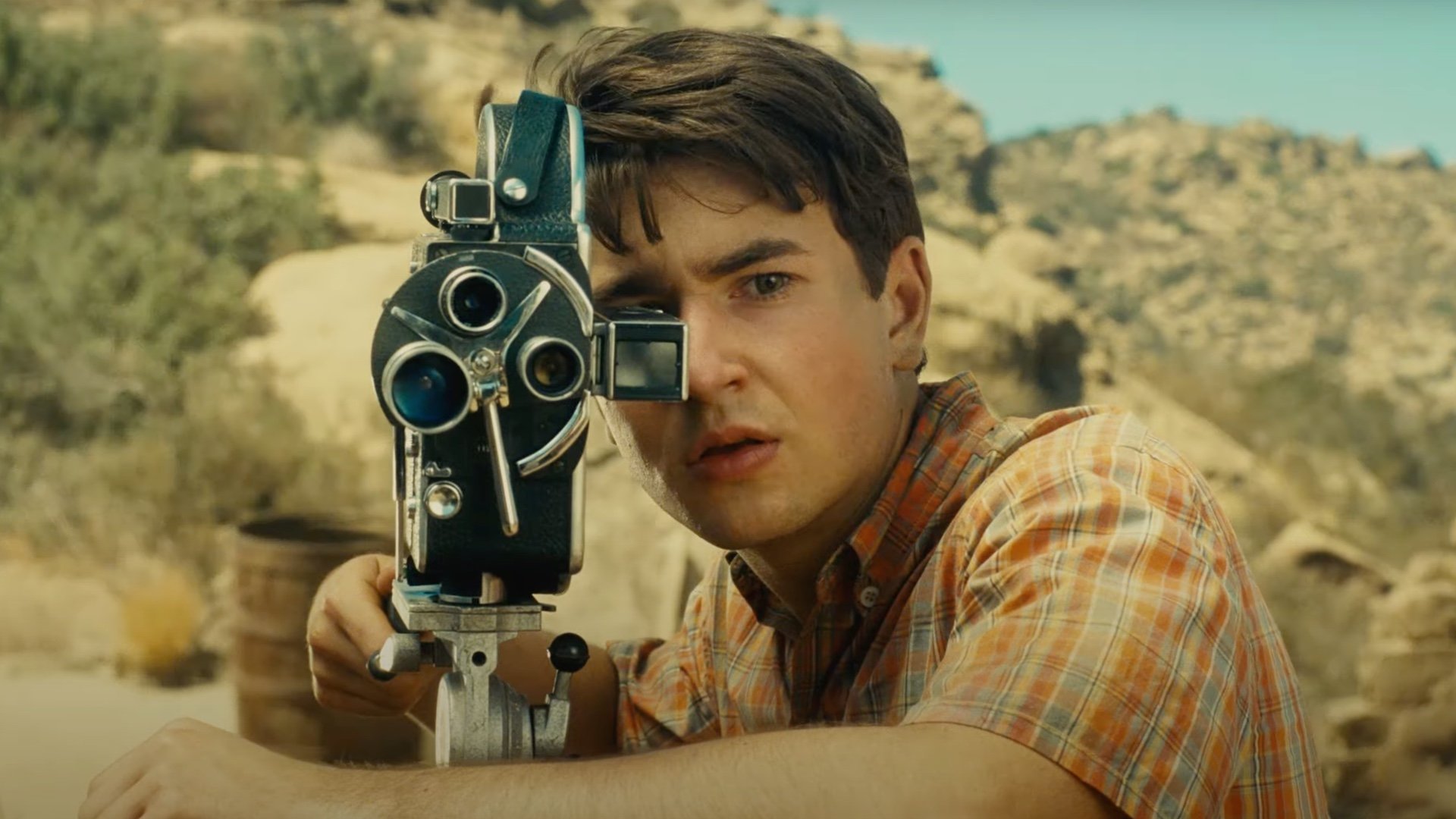
We’re now living in the age of filmmakers’ autobiographical works, and we should only be thankful that one such work happens to be of Steven Spielberg. It’s a film he had meant to make since 1999 but withheld from doing so as he felt his parents would misinterpret his representation of them. In his portrayal of the artist as a young man, he made a film that, like all great autobiographical works of art, just feels like a film he was always destined to make. With a final scene that’s quite possibly the finest in his entire filmography, Spielberg presents to us an invaluable moment from his youth that retrospectively must seem, even to him, as a passing of the baton.
Throughout The Fabelmans, Spielberg places a heavy emphasis on the faces of his characters. As someone whose own life was changed by films, this choice shows the unparalleled ability of cinema to momentarily transport his viewer from their present reality, the epic nature of the face on a cinema screen, and the transformative effect films can have on their viewers.
The film is full of sequences whose distinct styles are unlike anything Spielberg has ever attempted – his melodramatic discovery of his mother’s infidelity, the short period of time he gets to share with his eccentric uncle, or his mother’s ethereal dance in front of the headlights during their camping trip. This shows how the film, more than being a coherent look at his childhood (which too it is), is a medley of styles and influences from throughout Spielberg’s life, presented to us with an unabashed degree of sentimentality that feels extremely self-aware on his part.
12. Close Encounters of the Third Kind (1977)
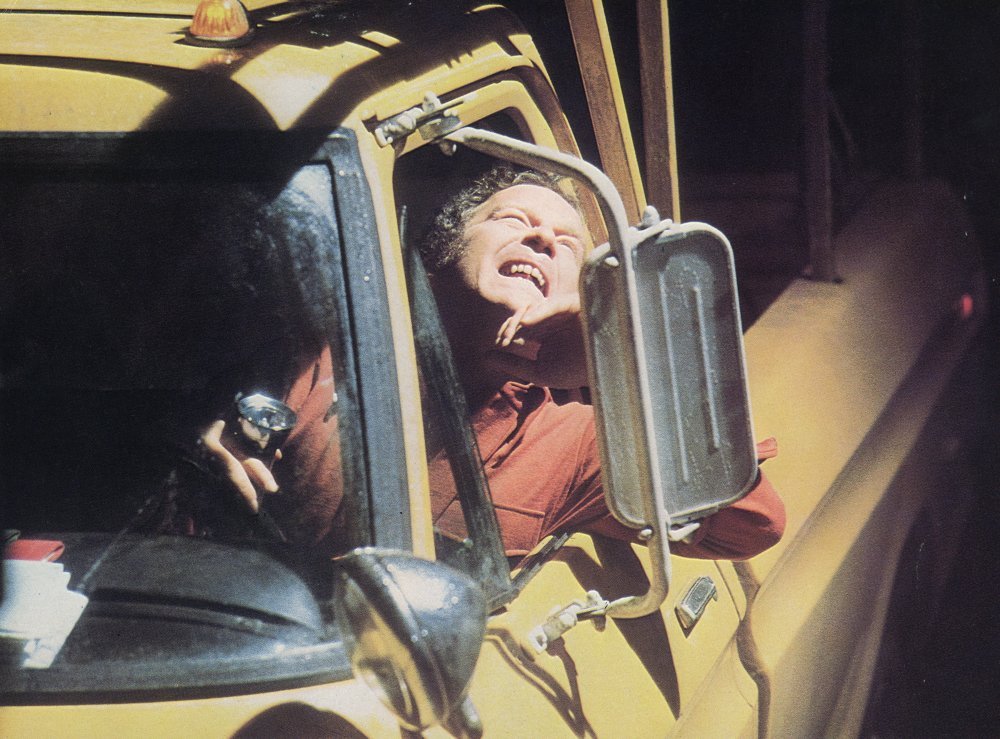
In an interview with Amitabh Bachchan, Spielberg joked that he never made a Star Wars film because he did not want to venture into space in search of alien life but rather have them land in his own backyard. That’s exactly what his first foray into alien life is – an existential reckoning arising from an encounter with the unimaginable, irretrievably changing the lives of those who experienced it as it all unfolds amidst the most ordinary circumstances. Yet it’s also an encounter that is humanized by showing the first interaction between the aliens and mankind taking place through music.
Related to Steven Spielberg: All Jurassic Park Movies Ranked From Worst to Best
It marked Spielberg’s first collaboration with editor Michael Kahn and his only collaboration with the legendary visual effects artist Douglas Trumbull. It can be argued that ‘Close Encounters…’ is really two films. One of them is the first 110 or so minutes leading up to Devils Tower, which can be amusing as well as a little frustrating at times, and the second one is the final act when Lacombe (played by Francoise Truffaut in his only film acting role) and his people make contact with the mother ship.
It is a testament to Spielberg and Trumbull’s vision that despite being nearly half a century old, the appearance of the mothership, like a city in the sky, is still capable of making jaws drop owing to its sheer sense of grandeur. Made during the Cold War, when speculation about extraterrestrial life was always intertwined with the paranoia of being watched, Spielberg went on comment about the film’s theme of contact by saying ‘If we can talk to extraterrestrials in Close Encounters of the Third Kind, why not with the Reds in the Cold War?’
11. Jurassic Park (1993)
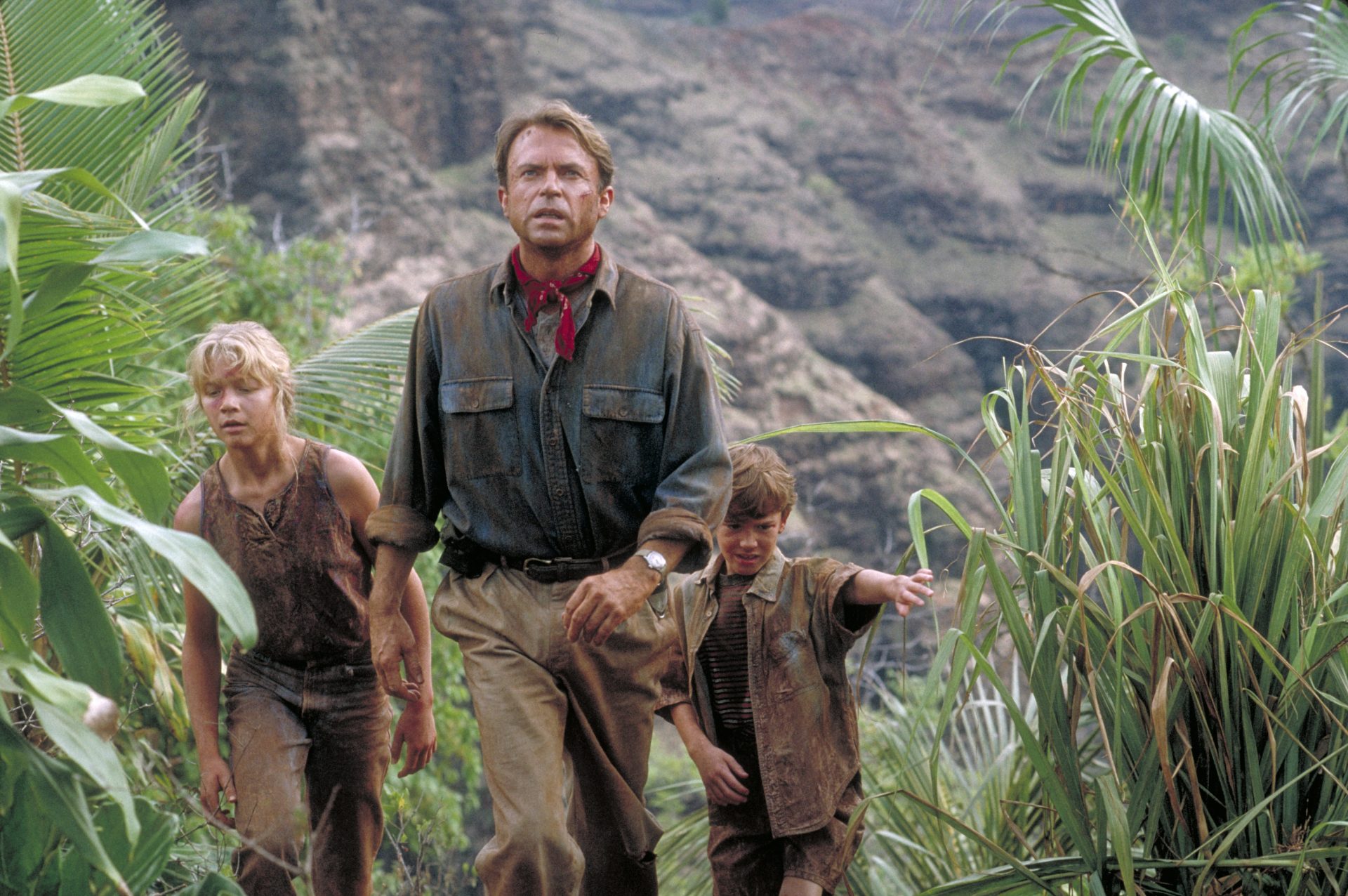
If a filmmaker has made Jurassic Park and Schindler’s List, their lackluster filmography can be forgiven. Spielberg’s filmography is anything but, and not only did he make these two films, he essentially made them simultaneously. This feat, something he called a bipolar experience’, alone cements the staggering vastness of the man’s legacy and genius. With ‘Jaws,’ Spielberg created the summer blockbuster, and with ‘Jurassic Park,’ he took it to new heights. Not only was the film a commercial success, but it also enabled multiple filmmakers with passion projects that technological limitations had stifled to realize them thanks to the groundbreaking work done in bringing the dinosaurs to life in this film.
Like all the great Spielberg films, ‘Jurassic Park’ is, first and foremost, an exercise in spectacle and wonder through extremely human lenses. The awe that a Brachiosaurus inspires or the terror of a T. Rex would mean little if the film wasn’t peppered with the effortless charisma of Ian Malcolm or the change that we witness in Alan Grant. And is there anything new that can be said about John Williams’s magnificent score?
It’s a film of precisely appropriate proportions, where every element seems to fit into place. This was best described by the man himself when he said that he used ‘every ounce of intuition on Schindler’s List and every ounce of craft on Jurassic Park.’ As Grant looks at a pelican and the helicopter flies into the sunset after a rather difficult night, anyone watching it for the first time will be bound to believe that ‘Jurassic Park’ really is an adventure 65 million years in the making.
10. Empire of the Sun (1987)
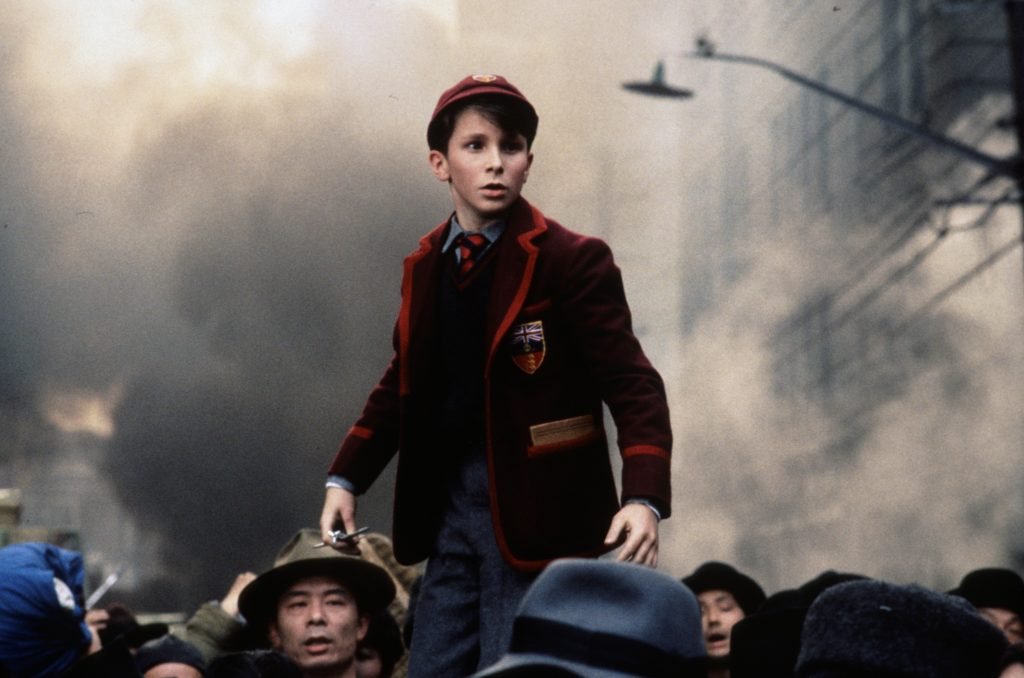
Initially meant to be a David Lean film, which he handed over to Spielberg, much to the latter’s joy, ‘Empire of the Sun’ set the template for the Spielbergian epic. While his ability to move from genre to genre has always been noted, his painstakingly methodical recreation of period worlds has always been brushed under the carpet in favor of his storytelling. Here, in the opening act set in Shanghai, his recreation of the city in the 1940s is akin to that in a Zhang Yimou period film, a lush and nostalgic world constantly underlined with forces that threaten to tear it apart. It was also the first American film that was shot in Shanghai in the 1940s.
Related to Steven Spielberg: 10 Best Performances By Christian Bale
Portraying war through the eyes of a child, it resorts to a whimsical tone from time to time in order to display Jim’s changing perception of the world around him, depending on the degree of difficulties he’s facing at the moment. Released a few years after ‘Merry Christmas, Mr. Lawrence,’ it is a similar portrayal of the complicated relationship in a state of war. To Jim, all that matters in war is bravery. Hence, despite his incarceration by the Japanese, he doesn’t see them as evil but as doing the necessary thing, which is exactly why he gets behind the Americans once they free him.
His gradual loss of innocence throughout the film reaches its climax as what he views as a moment of spiritual release is then revealed to be the bright light of humanity’s most monstrous invention. Yet it isn’t a film that ever resigns itself to grief and defeat. In fact, with its contemplation on war, love, parenthood, and Jim’s fascination with aviation, it is possibly the closest any film will ever be to a live-action Studio Ghibli film.
9. The Sugarland Express (1974)
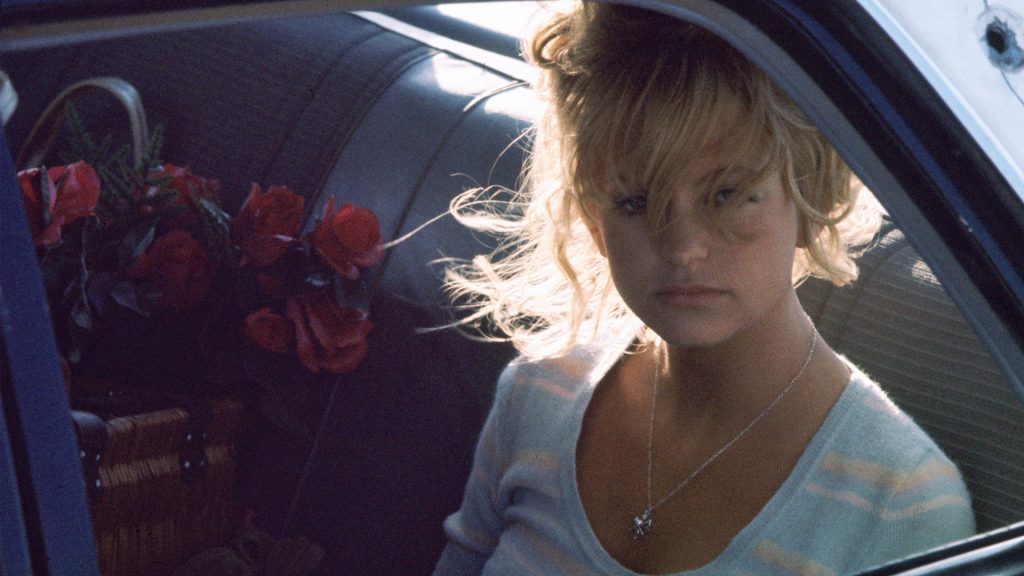
Spielberg’s parents got divorced when he was around 15 in what would become a major event in his life, the separation deeply affecting him, and subsequently, parenthood would seep into a great many of his films as an important theme. Here, in his theatrical feature debut (he had already made the fantastic horror film ‘Duel’ three years prior to this, for TV) for which he also won Best Screenplay at Cannes, that theme is prominent throughout.
Its plot, involving a chase across the state of Texas when a woman breaks her husband out of prison and takes a police officer hostage to get their son back from foster parents, is essentially a comedy despite its criminal aspect. In a most interesting observation, Pauline Kael said of Spielberg in her review, ‘He could be that rarity among directors, a born entertainer—perhaps a new generation’s Howard Hawks’ while also calling it one of the finest feature debuts ever.
Similar to this, Steven Spielberg Film: Badlands (1973): An Achingly Beautiful, Instant Classic Debut
Released a year after Terrence Malick’s exquisite ‘Badlands’ which dealt with a similar theme of young adults becoming a nationwide sensation as criminals, Spielberg’s iteration of a ‘lovers-on-the-run’ story is far more light-hearted and gives us a comical look at both America and Hollywood’s fascination with outlaws.
It’s a depiction of a filmmaker who clearly knows the intersection between entertainment, technique, and heart, as the first is constant. The second never gets in the way of either. At the same time, through crazy incidents, we are constantly reminded that whatever the two lead characters are doing, especially Lou Jean (Goldie Hawn), is simply to get their son back, who, in their eyes, has been unfairly snatched from them by the State. It would also mark the first collaboration between Steven Spielberg and John Williams, and the rest, as they say, is history.
8. Lincoln (2012)
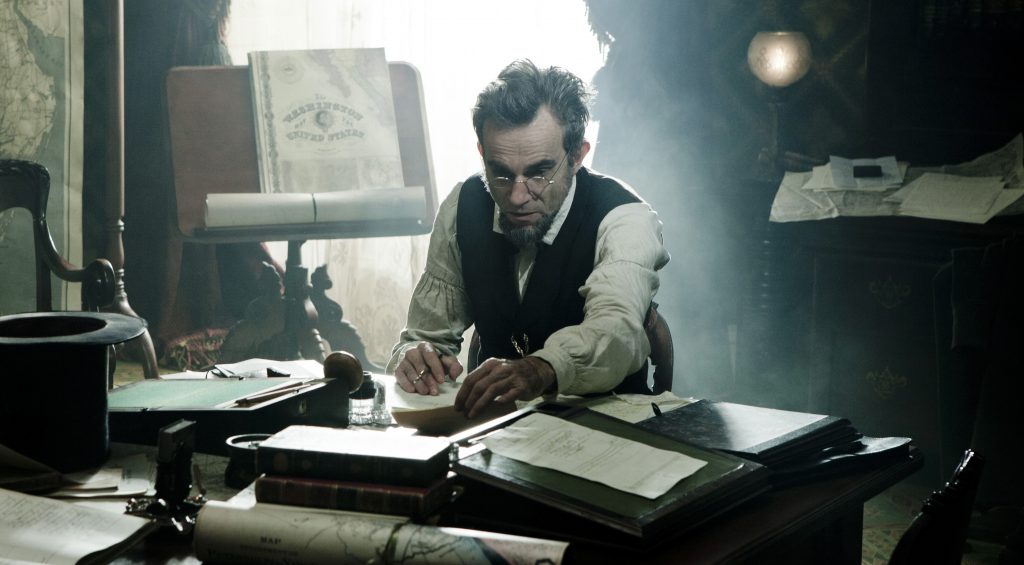
It is now remembered essentially as the film that formally cemented Daniel Day-Lewis’s status as the greatest actor of his generation after his third Academy Award for Best Actor win. And there’s no doubt about the credit he deserves, as do a lot of actors in its ensemble cast, especially James Spader’s terribly entertaining turn as W.N.Bilbo, Tommy Lee Jones’s amusingly acerbic portrayal of Thaddeus Stevens, and Sally Field’s dejected though resilient turn as Mary Todd Lincoln. But what tends to go unnoticed about ‘Lincoln’ is that it is the apex of Spielberg’s political films based on real events that started with ‘Schindler’s List,’ a calculatedly assured work of a director in full command of his craft.
Related to Steven Spielberg: 10 Best Performances By Daniel Day-Lewis
What makes it an anomaly in Spielberg’s filmography is how heavily focused it is on conversations and deliberations, which by virtue of its central concern with the Thirteenth Amendment to the United States Constitution, it has to be. Its autumnal world, not exactly grim but with its focus on browns and blacks, is a constant reminder of the turmoil the country is in while these actions take place in the rooms and halls far away from the action of the Civil War.
Released on the heels of the proudly sentimental ‘War Horse,’ it is a surprisingly restrained film on his part, with no characteristic bursts of emotion and also one unafraid to demystify the process by which the Thirteenth Amendment was passed. The complex political game it plays with its characters hence becomes a display of his maturity as a director. Also, the aforementioned cast makes it an important example of another one of his overlooked qualities – the ability to juggle ensemble casts expertly.
‘Lincoln’ is streaming on SonyLiv.
7. West Side Story (2021)

When a remake is being helmed by someone like Steven Spielberg and not as a cash grab opportunity by a studio, the question that instantly comes up is, ‘Can he better the original?’ Given the 1961 original’s iconic status and immaculate craftsmanship, that is a tall task. The original began with one of the greatest openings to a film in history, an introduction to the Jet-Shark rivalry done with a combination of sweeping cameras and editing more fluid than even the dance moves in the film. He doesn’t recreate that epicness right away. Instead, what emerges, slowly but steadily over the course of it, is a film so sure-footed that in it, he isn’t just trying to better the original – he knows that his iteration is better.
Related to this Steven Spielberg Film: The 10 Best Movie Musicals in Cinema
One of the first things that stand out about this version is the period recreation. Against the original’s more stage-like representation of Manhattan, largely empty and seemingly populated by just the gangs and their associates, Spielberg’s is a vibrant and lively world that lives and breathes. It is an essential facet in a film that isn’t just trying to entertain but, by its depiction of impoverished white communities, working-class immigrants, police prejudice, cultural gatekeeping, and sexual assault, is also pointing out the sad state of affairs that has kept the original film’s themes just as relevant today as they were sixty years ago.
With his first attempt at a musical, Spielberg just gives further proof of his status as a bonafide chameleon. ‘West Side Story’ is a reminder of the magic of cinema despite having a doomed love story at its heart. It is a spectacle that is a statement on Spielberg’s part to remind us that if there’s a director working today capable of bringing back Hollywood’s classical grandeur, it is he alone.
‘West Side Story’ is streaming on Hotstar.
6. The Post (2017)
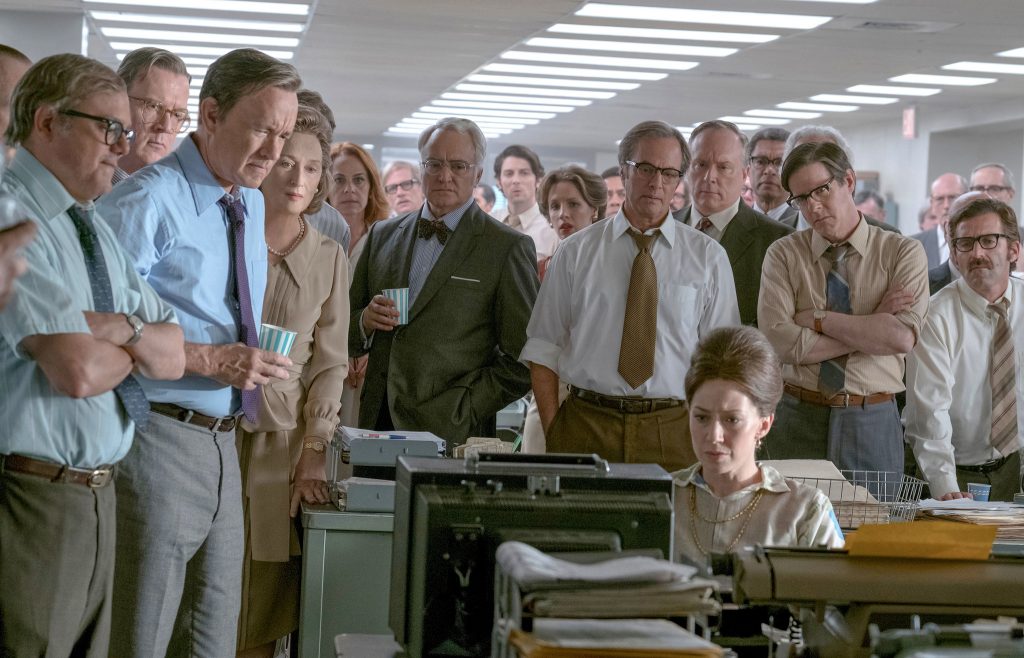
There’s something deeply satisfying in watching this film and realizing that Spielberg’s ability to make us root for his protagonists has reached such an assured stage that he can now make us cheer for journalists, newspaper owners, and editors in the same capacity as we would for a fedora and leather jacket-clad, devil-may-care adventurer. And equal credit for this swelling drama must go to Meryl Streep and Tom Hanks.
The nuance it takes to portray a character with as much power as Katharine Graham yet practically powerless feels effortless for Streep. As for Hanks, he seems to have finally turned into the mix of Jimmy Stewart’s everyman meets Cary Grant’s smugness, one you will trust to land an airplane on a cliff in a blizzard if he says he can, which he had been edging towards for a while now.
Given the nature of the story of the exposé, many directors could have made it into a thrilling look at a risky investigation. But it really does take a Spielberg to make tangible the degree of the peril that was faced by all involved in this. And it isn’t just about the news. It’s just as deeply concerned with Katharine learning to take charge of her career that she cares about more than anyone around her pretends to, imbuing it with an emotional core that reminds us just how personally important it is to her to ensure the maintenance of the freedom of the press, even if it risks imprisonment and destruction of her ‘legacy’.
So as the drama arrives at its conclusion and she talks about news being the ‘first draft of history,’ we are bound to believe her as we have been inside the suffocating cloud of cigarette smoke in the newsrooms, the motel room where a thunderstorm is gathering and the gilded cage from which Katharine had to break free.
‘The Post’ is streaming on SonyLiv.
5. War of the Worlds (2005)
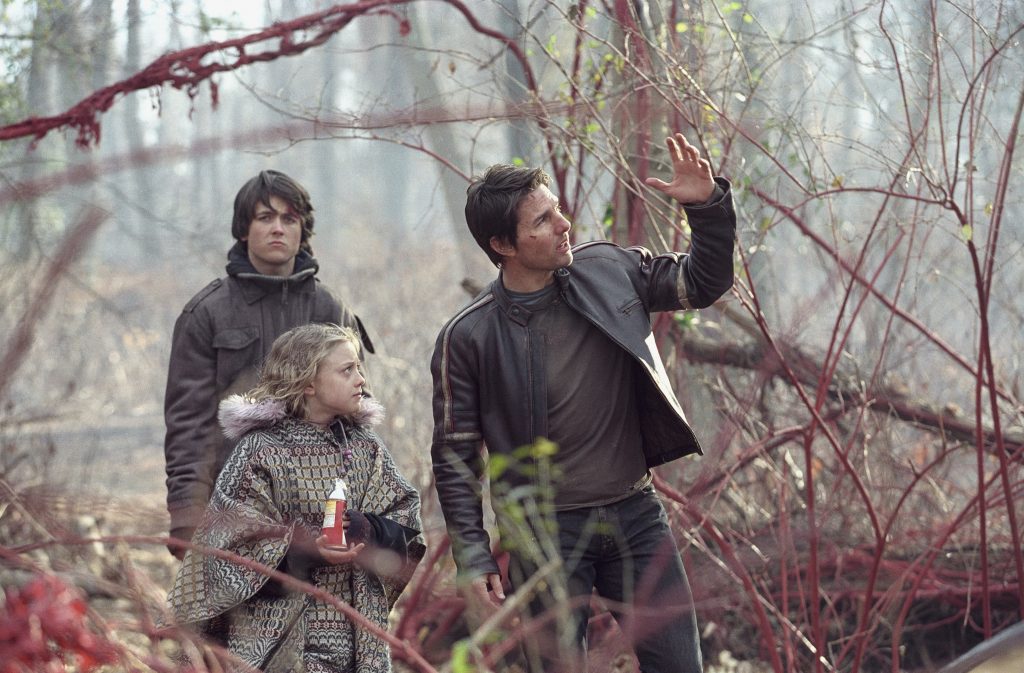
Spielberg’s adaptation of H.G.Wells’s seminal novel is among his scariest films, made all the more so by the Lovecraftian look of the Tripods that come to terrorize Earth. In a world still reeling from 9/11, he depicts the extent to which a short-lived disaster can still cause widespread catastrophe, with a foreboding opening echoing the molecular terror from the opening of Kaufman’s ‘Invasion of the Body Snatchers.’ It’s also a terribly complex film visually as long takes along the rubble of a world being constantly torn apart capture the inescapability of this nightmare by never letting us feel like there’s a break to the perils, which there never is for Ray, Robbie, and Rachel.
Related to this Steven Spielberg Film: 10 Best Sci-Fi Movies of the Last Decade
Yet amidst this carnage, it has a dreamlike beauty about it – the hallucinatory glimmer of sunlight on a river right before the current brings with it a number of abandoned corpses or a running train on fire with no life aboard as if being driven by that very fire. And its humanity lies in the protagonist’s pacifism, making its ending almost perfect as it sticks to its stance about not being a film that is about fighting but about surviving.
But what makes it among Spielberg’s best works is that it is the culmination of his fascination with using ellipses to depict danger. The fear of the unknown and the very human desire to not look at danger are expressed by the monsters being viewed through the screen of a video camera or the rear-view mirror of a car till the horror is turned against itself once Cruise holds a mirror up to a tentacle of a Tripod, sealing its fate in that very moment.
‘War of the Worlds’ is streaming on Netflix.
4. Jaws (1975)

Once upon a time, it wasn’t January or February when studios released the films they knew wouldn’t perform well but in the summer, while potential hits were released in the winter. It all changed when in the summer of 1975, Steven Spielberg, fresh off the critical success of ‘The Sugarland Express’, took over the film adaptation of Peter Benchley’s 1974 novel, ‘Jaws’.
Following a heavy TV-advertisement campaign, an unusual approach to marketing a film at the time, it also received an unusually wide theatrical release, and well, not only did it become the highest-grossing film of all time (for two years before ‘Star Wars’ surpassed it), it effectively established the concept of the ‘summer blockbuster.’ One simply cannot overstate the importance of ‘Jaws’ in reviving Hollywood’s economy at a time when its director-driven films had practically caused a recession in the industry.
To appreciate ‘Jaws’ merely for commercial reasons would be terribly shallow as it also is a benchmark for a monster film and a suspenseful experience. Taking cues from the monstrous truck in his debut film ‘Duel,’ its emulation of Hitchcockian suspense predated De Palma’s monopoly over that style of filmmaking. It also established Spielberg’s suggestive style of depicting terror since, for most of the film, the shark is not even seen onscreen.
His interest in characters is also predominant throughout the film as the characters of Brody, Hopper, and Quint are actually paid more attention to than the terror of the shark. Quint’s iconic monologue on the sinking of the U.S.S. Indianapolis is as memorable a scene from the film as Brody’s last stand. While it’s a truth universally acknowledged that music can entirely change a film or a scene, John Williams’s score for ‘Jaws’ is the most accessible proof of that maxim. His musical score really is a supporting character, especially the haunting minimalist piece whenever the shark approaches.
3. Schindler’s List (1993)

Notwithstanding the general acclaim of the film, ‘Schindler’s List’ has a number of notable detractors. There’s Kubrick’s famous comment, ‘The Holocaust is about 6 million people who get killed. Schindler’s List is about 600 who don’t’, a sentiment that Gilliam echoes. Haneke abhors the suspense in the scene where the train full of women who accidentally landed at Auschwitz confused a shower with a gas chamber, while Godard accuses the film of profiting from a tragedy.
Yet all these arguments seem to overlook the importance of the film in reigniting discourse on the Holocaust at a time when antisemitism and Holocaust denial were on the rise, something Spielberg reiterated in his Oscar speech. The process of making the film was especially harrowing for him as, over the course of it, he had to reckon with his own history and heritage.
Related to this Steven Spielberg Film: 20 Best Black and White Movies of the 21st Century
What the detractors of ‘Schindler’s List’ seem to focus on is that the film treats Oskar Schindler’s actions as some triumph, which it hardly is. Instead, it is a deeply moving reflection on a minor, pyrrhic victory achieved amidst the wreckage of a colossal failure on humanity’s part and the culmination of Spielberg’s humanistic style of filmmaking. It also would be the first time that he ventured into a historical drama based on real events, a genre he would return to regularly and still does, and which has given us some of his most mature and accomplished works.
With its Expressionistic style and Williams’s heart-wrenching score, it’s a film that marks a director coming into his own. Whether it is among the greatest films or not will be subjective, but it certainly is one of the most important films of all time and an especially shining achievement in a filmmaker’s career with no dearth of them.
‘Schindler’s List’ is streaming on Netflix.
2. Indiana Jones and the Last Crusade (1989)
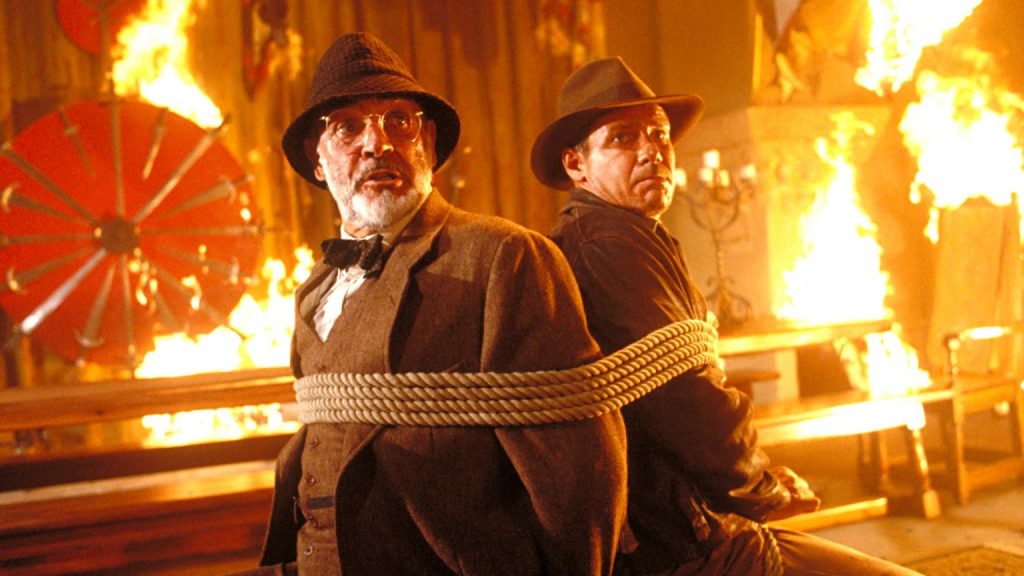
No one doubted that the outcome of a collaboration between Steven Spielberg, George Lucas, and Philip Kaufman would be positive, but surely no one foresaw what it would lead to. With ‘Raiders of the Lost Ark,’ Spielberg captured lightning in a bottle and added an entirely new chapter to the history of adventure films and action films while giving us the ultimately loveable rogue in Harrison Ford’s portrayal of Indiana Jones. Whether ‘Temple of Doom’ lived up to that standard remains hotly debated to this day. With ‘The Last Crusade,’ he did the impossible – he not only made another fantastic action-adventure movie but managed to better his work on ‘Raiders.’
In retrospect, given its central concern with the bond between a father and a son, it even feels more archetypal of a Spielberg film than ‘Raiders’ or ‘Temple of Doom.’ In fact, ‘Last Crusade’ is the most character-driven film in the series, and all the better for it. It brings Marcus Brody back and makes him this fantastically balanced sidekick to Indy. Salah, too, returns, and Indy’s emergent bond drives even the finale of the film with his father. And there simply could not have been a better casting choice than Sean Connery as Henry Jones, Sr. Every line that he delivers in the film, and there’s a plethora of memorable ones, is tailor-made for the legendary Scotsman.
It’s also the funniest film in the series, especially because its humor is so perfectly simple, like the stamp joke in the Venetian library or the ‘X marks the spot.’ ‘Indiana Jones and the Last Crusade’ is pretty much the epitome of Spielberg’s style, the mix of meticulous craftsmanship, pure entertainment, and edifying storytelling that has made him such an enduring figure in film history.
1. A.I. Artificial Intelligence (2001)
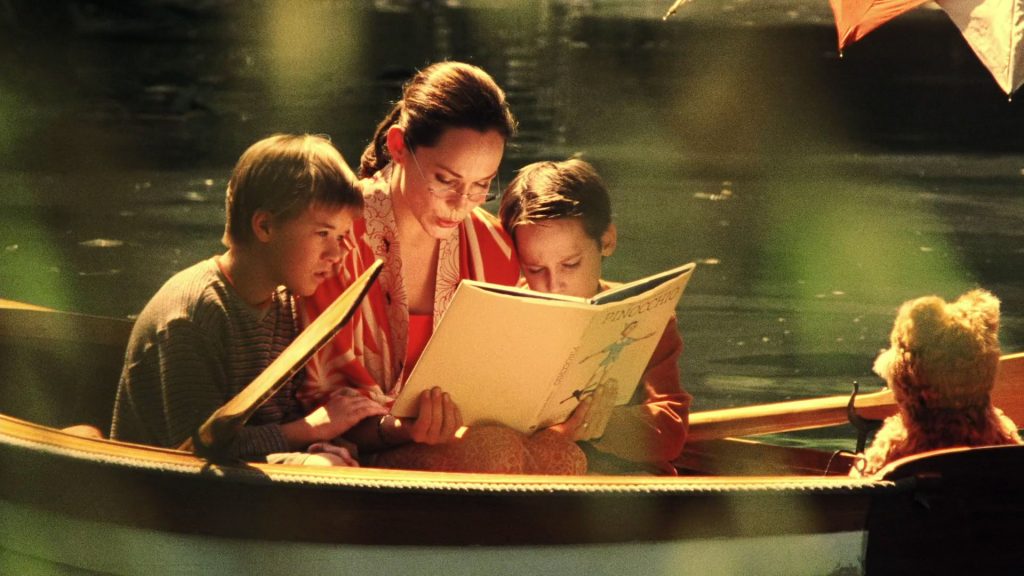
The colossal task of taking over a Stanley Kubrick project can never be overstated, and yet for Spielberg to have done it in the early-2000s could not have been a more fortuitous turn of events. It was a time that saw him delve deeply into philosophical inquiries in all his films, leading him to make films that used the resources of Hollywood’s studio system to contemplate profound ideas, in this case, the question of love and whether it can be exclusively attributed to the human race. It is his most ambitious project that shifts from one gigantic set-piece to another in the blink of an eye but never loses touch with its core humanity, making it, like David, a truly unique work.
In ‘A.I. Artificial Intelligence’, fantasy intermingles with science-fiction to sublime effect, and given his penchant for depicting the motions of childhood, especially the loneliness of it as he did with ‘E.T.,’ it can be argued that for the project to have eventually been realized by Spielberg and not Kubrick was a blessing in disguise. Kubrick’s more objective and less emotional approach could never have given it its intimate beauty. And it is this beauty that also makes it Spielberg’s saddest film, one whose hypnotic final act, even without the heartbreaking ending, is deeply and unceasingly melancholic.
Moving from the innocence of childhood owing to the lack of knowledge about the world at large to experiencing how dark and indifferent the world is to an ending whose shattering effect cannot be put into words, ‘Artificial Intelligence’ is Spielberg’s ultimate masterpiece. It is an epitome of a director working at the height of his powers while also being the pinnacle of his career-long fascination with parenthood, love, family, and friendship.


